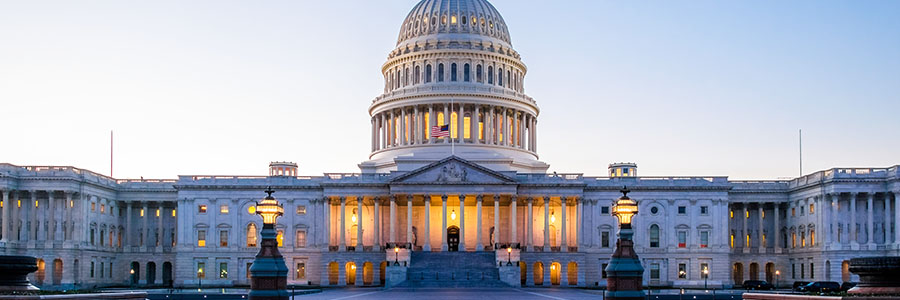Speaker 1:
Welcome to TD Cowen Insights, a space that brings leading thinkers together to share insights and ideas shaping the world around us. Join us as we converse with the top minds who are influencing our global sectors.
Chris Krueger:
Good morning. Welcome back to TD Cowen Street Cred. I am Chris Krueger with TD Cowen's Washington Research Group. And we'll attempt to translate K Street to Wall Street faster than a speeding Acela, and even faster if you juice up the playback. We're now four for four on Tuesday mornings, which Coach Lou Brown would call a winning streak. So with four weeks until the election hopefully ends, wanted to flag three areas we are watching. The race is for the Senate, the House, and the looming tax cliff. It's still 2024, so expect the unexpected.
Okay, the undercard, the race for Congress. Why is this important? Well, it's always important because it's the Congress, right? But all tax bills originate in the House. And the Senate confirms judges, the cabinet, and regulators. That historically tight margins in the Congress reflect the political realities of a bitterly divided and regionalized electorate.
Want to flag four key dates to watch, which all start after the election. So 36 days after Election Day is the national deadline to complete the counts, December 11th. A lot of these House races could well be counting up until and, or in recounts. Second big date, December 17th. That's when the electors vote in state capitals on the presidential election. January 3rd, 2025, the new Congress is sworn in. And then January 6th, the new Congress certifies the presidential election.
Big picture right now, Congress is likely to barely switch control to opposite parties. That would be the first time that they would flip to opposite parties in the same election ever. So, very on brand for 2024. So, the very narrow Democratic Senate probably goes Republican and the very narrow Republican House likely goes Democratic. We have a four and a half trillion dollar tax cliff looming. Reminder tax and fiscal policy, that's the sweet spot for the Congress. That's their meat and potatoes.
All right, real quick, the Senate, it's currently 51, 49 Democratic controlled. Every state has two senators. There are a hundred senators. About a third of the Senate is up every election, so about a third of the Senate cycles out. Geography is largely destiny and every couple of cycles, one party gets a really good map or vice versa, a really bad map. And the map is just really rough for Democrats this time around.
There is a huge correlation within the battleground states and the Senate races. But then you also have Democrats playing defense pretty much across the board. Democrats have to win all the battleground states in the Senate and then they have to win two states that Donald Trump has won twice, Florida, Ohio, Montana, Texas. If you're a Democrat and sort of your best case scenario is Ohio, Montana, Texas, not great. There is a very narrow window for Democrats to hold the Senate, but it's going to take a really, really good night for the Democrats to do that.
Okay. The reverse of the Senate in many ways, is the House, particularly this cycle. So there are 435 members of the House, it's proportional by population, two-year terms. The Republicans currently have, call it a four-seat majority in the House. Democrats are going to pick up at least one just on redistricting alone. And as good as the map is for Republicans in the Senate, it's reversed in the House.
So of those 435 House seats, really only about 40 of them are competitive. So yes, 90% of the House races are not competitive. But when you dig into where those seats are, the competitive seats, a lot of them are in California and New York, where former President Trump is going to have a lot of headwinds. So, you have 17 House Republicans in districts Biden won in 2020. Only five House Democrats in Trump won seats from 2020. Reminder though that a lot of these seats are on the West Coast. It's going to take a long time to count, so we would be very surprised if the House majority, let alone the margin, was known the morning after election day.
Okay. I mean, putting aside the Senate's role in confirming the cabinet, regulators, and judges, etc, the fiscal delta between these two candidates is incredibly stark. I mean, if you want to go to the extremes on either end, the Committee for Responsible Federal Budget has the potential fiscal delta between Harris and Trump at over $15 trillion. This is because you have the expiration at the end of next year of all the 2017 Tax Cuts and Jobs Act individual rates. They all sunset or revert back to Obama-era levels.
We count five main areas that are probably going to be some of the bigger fights in this. This is excluding things like the no tax on tips and new fights. But all the top income tax rates revert back to Obama-era levels, that top rate reverting back from 37 to 39 6, unless Congress and the president get involved.
Going to be a huge fight on mortgage. Current mortgage interest limited to debt up to 750,000. HELOC deductibles also revert back. Salt, probably the most expensive fight. The current $10,000 cap is removed and reverts back to unlimited, though would not expect a full reversion in any deal. Perhaps a new cap of 20,000 as the new salient solution, but probably income adjusted. Tax Cuts and Jobs Act, you double the standard deduction. And then also the estate tax, basically a doubling there as well. So just basically, next year is all about tax policy. Now, cap gains, dividends, and the corporate rate do not sunset. Although in a Harris win, we would expect attention there, if only to offset some of the other measures, things like the Child Tax Credit and others.
Taxes remain at near historic lows. Tax menu is really going to be extensive though, given the need for, in theory, a lot of offsets. Reminder that the CBO deficit baseline presumes all of these taxes do revert. So if you presume that we're not going to raise taxes on just about every single citizen, the deficit projections actually far worse. We'll have a conversation about that next year because the debt ceiling returns next summer.
Okay, that's a wrap. This has been Chris Krueger with TD Cowen's Washington Research Group for Street Cred.
Speaker 1:
Thanks for joining us. Stay tuned for the next episode of TD Cowen Insights.









